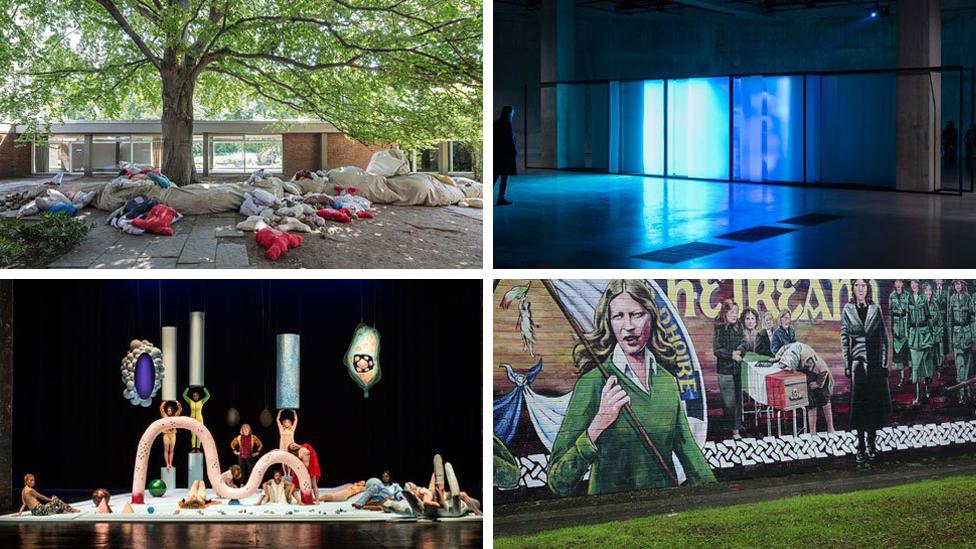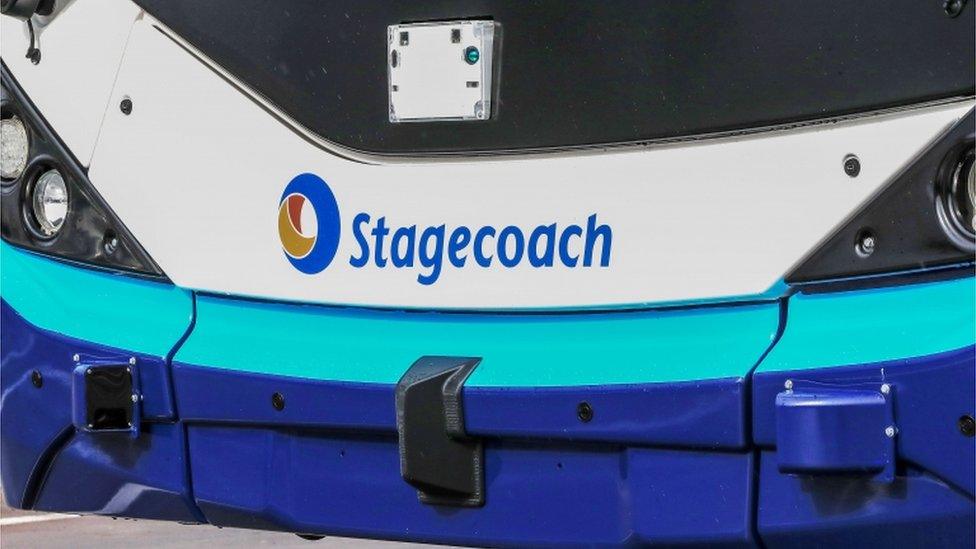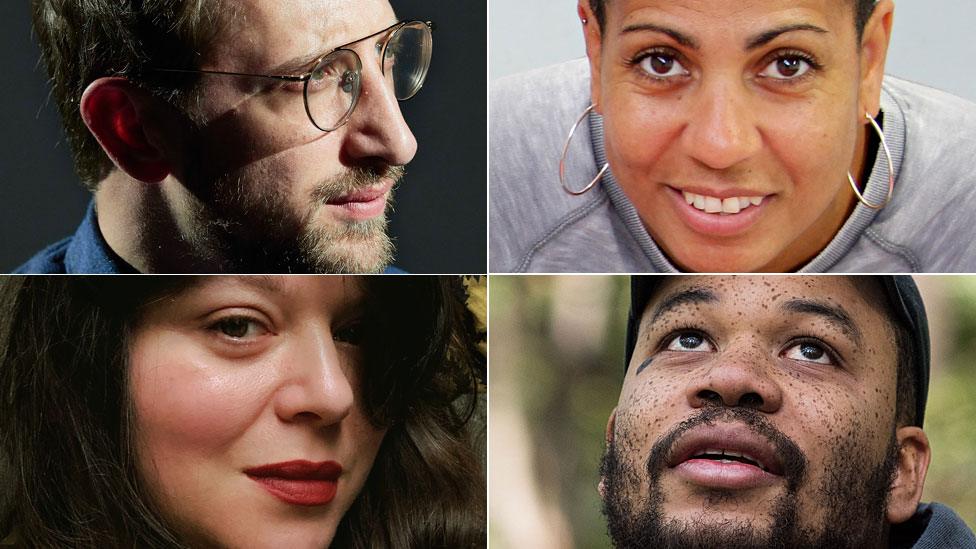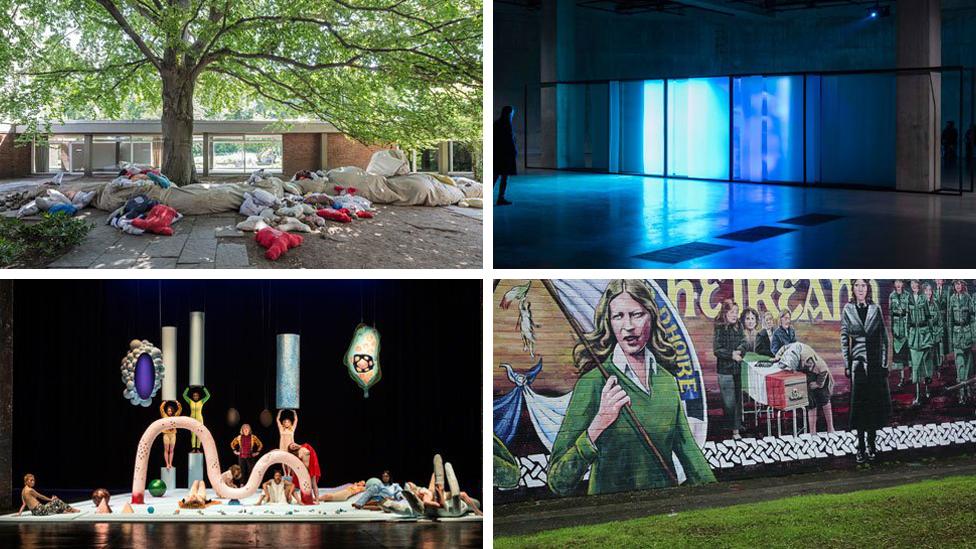Turner Prize drops Stagecoach sponsorship over LGBT controversy
- Published

The artists shortlisted tackle issues such as oppression and marginalised communities
The Turner Prize has ended a sponsorship deal with Stagecoach South East - a day after it was announced.
The firm was to support an exhibition of the four shortlisted artists at the Turner Contemporary gallery in Margate.
But there was criticism as the chairman of its parent company had backed a ban on teaching LGBT issues.
The local bus company said the decision had been "mutually agreed" and while it was committed to diversity did not want anything to distract from the artists.

The bus company says the decision to end its partnership was mutually agreed
Gay rights campaigner Peter Tatchell was among those against the prize's partnership with Stagecoach South East. He told the Daily Telegraph, external he was "surprised and disappointed" when he heard the announcement.
Sir Brian Souter, who backed a failed campaign 19 years ago to keep Section 28 - a law banning teachers discussing gay rights in schools - is the co-founder and chairman of the Stagecoach Group.
In a statement, Turner Contemporary and the Tate gallery - which organises the annual prize - said its priority was to "show and celebrate" artists and their work.
It said: "The Turner Prize celebrates the creative freedoms of the visual arts community and our wider society.
"By mutual agreement, we will not proceed with Stagecoach South East's sponsorship of this year's prize."
In a later statement, Tate said it didn't know about Sir Brian's views on gay rights when it agreed the deal.
"The corporate agreement was between Turner Contemporary and Stagecoach," it said.
"The relevant legal and financial due diligence was observed. Neither Turner Contemporary nor Tate were aware of the wider issues."
Stagecoach South East said: "We are absolutely committed to diversity in our company, however we do not want anything to distract from celebrating the Turner Prize artists and their work."

Clockwise from top left: Lawrence Abu Hamdan, Helen Cammock, Oscar Murillo and Tai Shani
The winner of the £40,000 prize will be announced on 3 December.
This year's Turner Prize nominees are Lawrence Abu Hamdan, Helen Cammock, Oscar Murillo and Tai Shani.
The shortlist of artists was announced on Wednesday and their work tackles issues including oppression and marginalised communities.
Last year's Turner Prize was won by artist Charlotte Prodger for her film on her experience of coming out as gay in rural Scotland.

Other recent arts sponsorship controversies
In March, the Sackler Trust suspended new charitable donations in the UK amid claims that the Sackler family fortune was linked to US company Purdue Pharma and its controversial opioid painkiller OxyContin. The announcement followed the National Portrait Gallery and the Tate rejecting donations from the Trust.
Last year, defence giant BAE Systems withdrew its sponsorship of the Great Exhibition of the North. The move came after two acts pulled out of the event in protest.
According to The Art Newspaper, external, the annual Photo London photography fair is seeking to remove itself from a partnership with two London hotels owned by the Sultan of Brunei. Brunei is facing international condemnation for passing strict new laws that make gay sex an offence punishable by death.

Analysis by Will Gompertz, BBC arts editor
Life has never been easy for arts fundraisers. Typically sport takes the lion's share of corporate sponsorship, with arts organisations feeding off any scraps of company cash that might be left over.
There is not a history of companies queuing around the block to financially support exhibitions and gallery refurbishments. It is a small pool in which fundraisers have to fish, and it's now in danger of evaporating altogether.
The public scrutiny museums, theatres, orchestras and other arts bodies now find themselves under is unprecedented. The effect is two-fold.
Firstly, corporate sponsorship deals nowadays must be able to withstand forensic examination by stakeholders and the media, which Turner Contemporary's deal with Stagecoach could not.
Secondly, the negativity surrounding arts sponsorship - from the Sackler Trust controversy to BAE Systems withdrawal from supporting the Great Exhibition of the North - is extremely off-putting for companies that might be thinking of entering the arts arena.
What has also become absolutely clear over the past 12 months is that arts organisations have to up their game when it comes to basic due diligence before accepting a sponsor's money.
It is no longer good enough to check the credentials of the sponsoring company. They now have to make sure the personal values of those who run and own it are compatible with their own charitable objectives.
A quick Google search won't do. Twitter feeds, Instagram posts and other platforms for public comment all have to be rigorously checked.
All of which means more work for already hard-pressed fundraising departments operating in arts institutions that are still feeling the chill wind of austerity. Theirs is a difficult and thankless job that has now become much, much harder.

Follow us on Facebook, external, on Twitter @BBCNewsEnts, external, or on Instagram at bbcnewsents, external. If you have a story suggestion email entertainment.news@bbc.co.uk, external.
- Published2 May 2019

- Published1 May 2019
